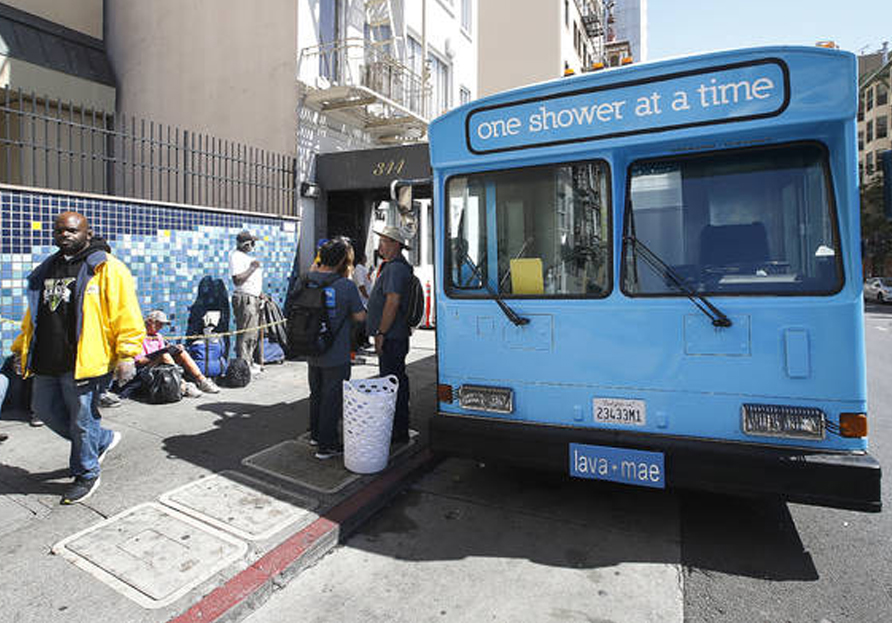The city has imported an idea from San Francisco to convert two obsolete Honolulu city buses into Hawaii’s first “mobile hygiene centers” to give Oahu’s homeless a place to use the bathroom and clean themselves.
The city is seeking proposals for a nonprofit group to use $200,000 in city money to retrofit the retired, 40-foot buses and another $200,000 for one year’s worth of operating funds.
Proposals are due to the city by 2 p.m. May 10.
The idea is not intended to directly move anyone off the street and into permanent housing, although it could connect homeless people to services that could lead to housing.
But in San Francisco two years ago, city officials, tourists and area homeless told the Honolulu Star-Advertiser that the so-called “Lava Mae” buses help keep streets clear of human feces and urine while giving the homeless a sense of dignity. The original “Lava Mae” program has since expanded to Los Angeles.
The name is a play on the Spanish verb “lavar,” or “to wash.”
The buses operated in San Francisco by the Lava Mae nonprofit group park every day in areas frequented by the homeless and tap into city fire hydrants for water for showers, toilets and sinks. The city also operates a separate program that tows toilets and sinks — but no showers — to different areas of the city frequented by the homeless.
The idea to recycle Honolulu buses for rolling showers and toilets has been kicking around for years. But last year it got a boost when Reid Mizue, owner of Omizu Architecture, teamed with architects from G70 to work pro bono on design plans for mobile hygiene centers.
Their plans — which the winning nonprofit group will receive — call for each bus to be retrofitted to include three full bathrooms with sinks, toilets and showers.
How and where they would operate on Oahu would be up to each nonprofit’s proposals.
The project gave Mizue an opportunity to lend his architecture skills to a problem — homelessness — that can seem overwhelming.
“The general public realizes there’s a need for something to assist the homelessness effort,” he said. “We were happy to help.”
To other professionals concerned about island homelessness, Mizue said, “Don’t sell yourself short. Pitch in and get involved.”
There is only one public hygiene center on Oahu, at the city’s Pauahi Hale housing project in Chinatown. Every day an estimated 60 to 70 people use the adjacent men’s and women’s shower and toilet, according to Mayor Kirk Caldwell.
This year the city plans to launch a much more ambitious hygiene center on the ground floor of a city-owned, four-story building in Iwilei that will include plans for a second story just for homeless services, along with two floors of housing for the homeless.
In a statement to the Honolulu Star-Advertiser, Caldwell said, “Now in its third year of operation, our hygiene center at Pauahi Hale in Chinatown continues to provide shower services to 60 to 70 people daily. Converting two decommissioned city buses will expand this effort and provide much-needed hygiene services to people experiencing unsheltered homelessness across Oahu.”
Groups bidding on the mobile hygiene centers must be nonprofits, said Jay Parasco, the city’s homeless initiatives coordinator.
The one selected for the contract will “get the buses as well as the plans and would be responsible for doing the conversion,” Parasco said. “They have to be a nonprofit and can partner with an existing service provider or service providers for where the buses would go to.”
The group that wins the contract would be required to have the buses running within four months.
To submit a proposal, register as a vendor and visit honolulu.gov/pur/helpguides.html. For further assistance, call the city’s Purchasing Help Desk at 768-5535 or email bfs[email protected].
